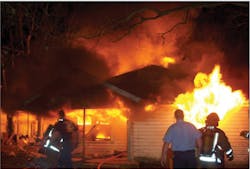Salka: There's Not Just One Way to Run The Fire Service!
There’s not just one way to run the fire service and I am tired of being bullied into a “culture of safety!” Now, just stop right there and hold your fire. No, I am not against firefighter safety and survival and reducing firefighter fatalities. I, and dozens of other fire service instructors, authors and officers, have been training the fire service for decades in the many subjects, issues, principles, skills and abilities that can help them stay safe. Every year, the firefighter fatality numbers are totaled and the outcry about our faulty “culture” begins. Let’s take a look at an article I read in the Texas Observer, “Hero Complex.” My first reaction to some of the statements and pronouncements I read in this article are listed below:
Article – “Evaluating risk vs. gain requires firefighters to refer back to the old mantra of tradeoffs. If there’s no possibility of saving a life, a firefighter isn’t supposed to risk losing his or her own (life).”
My response – How do you know if there is “no possibility of saving a life”? Is there a sign hanging in front of the building stating that nobody is home, not even grandma upstairs in the dark bedroom? It’s so easy, after the fire, when we have discovered that nobody was home, to be critical of the decision by the first-arriving officer to make entry and begin operations. If a firefighter is not killed or critically injured, and the same conditions existed, the fire never happened.
Article – “If conditions are such that a person inside likely couldn’t survive, a firefighter shouldn’t risk death to recover bodies”
My response – How do you know that a person inside likely couldn’t survive? HOW DO YOU KNOW? I know there are obvious conditions where nobody would attempt a rescue, but many structural fires look pretty serious and even dangerous from the front lawn, but after firefighters enter and make a fast attack with a hoseline and a rapid search, an unconscious victim is rescued by a determined and skilled firefighter. There is no script here. There is no exact set of conditions that indicate there are no survivors and when we should not enter.
Article – “Firefighters feel it is their duty to take unnecessary risks, even if that means dying or risking others lives.”
My response - You’re kidding right? Who are these firefighters and where do they serve? Firefighters feel it is their duty to take unnecessary risks? Now, I’m not saying I never had to slow down an aggressive and skilled firefighter on the fireground, but to say that firefighters feel it is their duty to take unnecessary risks is nonsense. I have worked in four separate fire departments over almost 40 years and I have never met such a firefighter. Secondly, firefighters greatly value the safety and lives of their fellow firefighters, and to say that they unnecessarily and consciously endanger their fellow firefighters is irresponsible and inaccurate.
Article – “The tendency to hire strong-willed alpha males – as most firefighters describe themselves and each other – into an aggressive and stubborn culture...”
My response – Who are you talking about? I love the use of the “strong-willed alpha males” term. Why didn’t you just say cavemen? How did you hire firefighters? I know lots of chiefs from all over the country who have well thought out hiring procedures and high standards for their new recruits. What firefighter application says, “We are looking for a few strong-willed alpha males”? I’m not even going to touch the male/female issue that you raise.
Article – “That attitude is institutionalized within fire departments so that veterans praise and respect rookies who act brashly.”
My response – Once again, I don’t know where you worked or what group of firefighters you are talking about, but anywhere that I have visited, instructed or worked was just the opposite. Veteran firefighters are historically tough and demanding of rookies or recruits. I don’t know a single senior firefighter who would praise or respect a rookie who acted brashly. As a matter of fact, brash recruits usually get a lesson in humility from the senior firefighter in their company. Most veteran firefighters promote a professional attitude and a serious work ethic with new members.
I could go on and on here but I won’t. I do want to mention a final point and it may be the most important. Why is there only one way, one attitude and one culture to some of us? Notice I said us! I can disagree with you and not be wrong. I can have a different point of view on tactics, risks, safety and not be wrong. One of the last paragraphs in this article stated, “There is a split in the fire service – between leaders who embrace updated practices and those who reject change.” Why is it that the author’s viewpoint is described as the positive “embracing” folks and those of us who disagree are the “rejecters”?
Something to think about....
